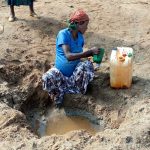Success Story of Fatoumatta L Kassama
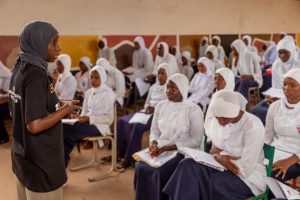
Before joining ISA, my team and I, with the support of our partners, organized advocacy campaigns on menstrual hygiene, period shaming, gender-based violence, and sexual and reproductive health and rights in schools and rural communities in The Gambia. Our main goal was to educate girls and women on period poverty and menstrual hygiene while educating boys on period shaming and its effects on women and girls. We also trained girls and women on how to make reusable sanitary pads using locally sourced materials. However, breaking the taboos surrounding these topics proved to be one of the biggest challenges we faced in achieving our SDG Goal 5. To encourage open discussions on menstrual hygiene, period poverty, period shaming, gender-based violence, harmful traditional practices, and sexual and reproductive health, we had to overcome cultural barriers.
The COVID-19 pandemic added another obstacle to our outreach activities, as movement restrictions and gathering prohibitions made it impossible to continue with our campaigns. However, during this period, I came up with the idea of creating an interactive board game that would enable boys and girls, parents, and children to discuss complex, taboo, and sensitive topics without feeling ashamed. This game would provide important knowledge for the realization of SDG 5 in communities. Unfortunately, I lacked the necessary skills to develop the game, and my attempts to do so in The Gambia failed due to my limited expertise and my full-time engagement in project work. However, my motivation was reignited when I learned about the ISA scholarship. Initially, I applied to ISA to further develop my menstrual hygiene education materials, as I did not feel ready to work on the game.
AT ISA
When I first arrived at ISA, I was excited but also a bit nervous. However, during the very first 1:1 coaching session with the ISA team, I shared my idea for a game, and to my surprise, it was met with great enthusiasm. The ISA team encouraged me to focus on the game as the centrepiece of my ISA project. They opened my perspective to ideas I had never considered before which gave me the confidence and motivation to dive into it headfirst.
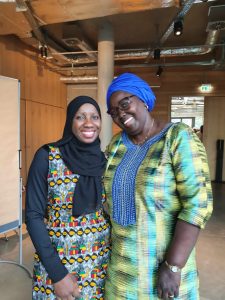
Throughout my time at ISA, I had the opportunity to work on the content of the game booklet, the design of the game board, and the creation of game cards. I was able to take advantage of all the resources and time that ISA provided, and the results were truly amazing. However, it wasn’t just about the game itself – the ISA workshops and internship opportunities I had with Akkon University in Berlin were invaluable. The proposal writing workshop taught me how to write concept notes and map potential donors, while the intercultural workshops helped me develop interpersonal skills that I hadn’t even realized I needed. Living and working with ISA fellows from all over the world was an eye-opening experience that challenged my assumptions and expanded my horizons in ways I never could have imagined. I made some great friends along the way, including Aminata Lo from Senegal, who became my best friend and helped me stay healthy and focused during my time in Germany.
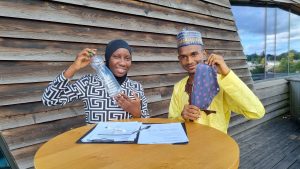
Another ISA fellow, Salisu Abdullahi, inspired me with his plastic project in Nigeria. We had many conversations about the potential for our projects, and these discussions eventually led to the creation of a joint project called P4P – Plastics for Pads. Our pilot project in The Gambia, which was launched in January 2023, has been incredibly successful.
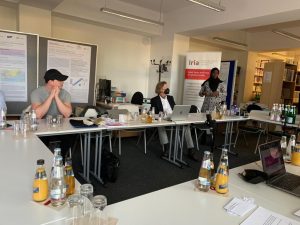
At Akkon University, I was welcomed as an intern by Gaby Feldmann and Prof. Dr Saskia. They were instrumental in helping me build my skills and make my work in The Gambia scientifically relevant. I also had the opportunity to spend a week with the team at WASH United in Berlin, where I learned how to start a campaign to engage the government of The Gambia and stakeholders in conversations about reducing or eliminating the tax on period products. Additionally, I contributed to the development of a training manual on how to make handmade reusable sanitary pads.
Of all the personal development benefits I gained from my time at ISA, one thing that stands out is the WeMPI (Weekly Monitoring Performance Index). This tool has been a game-changer for me in terms of improving my time management skills. I use it every day to plan my activities and evaluate my productivity, and it has become an integral part of my life. I only wish I had learned about it sooner in my career.
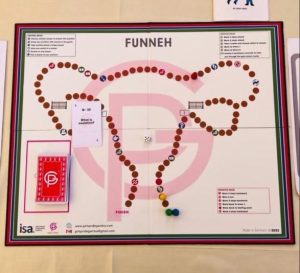 When it was time to return home, I was over the moon because I had achieved far beyond my expectations at ISA. Holding a prototype of the board game in my hands, I felt a sense of pride and accomplishment that I will never forget. In addition to my partnerships with Akon University and my colleague Salisu, I had gained so much knowledge, experience, and new friendships that will stay with me for a lifetime.
When it was time to return home, I was over the moon because I had achieved far beyond my expectations at ISA. Holding a prototype of the board game in my hands, I felt a sense of pride and accomplishment that I will never forget. In addition to my partnerships with Akon University and my colleague Salisu, I had gained so much knowledge, experience, and new friendships that will stay with me for a lifetime.
After ISA
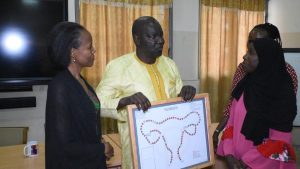
When I returned to The Gambia for the implementation phase, I was determined to make a difference for young girls and women in the country. After reaching out to the Director of Curriculum, Research, Evaluation, and Development Directorate (CREDD) under the Ministry of Basic and Secondary Education, I was thrilled when Girls’ Pride was authorized to introduce the board game on taboo and sensitive topics in schools. The game was designed to be a supplemental learning material that would make it easy and entertaining for teachers, NGOs, and community-based organizations to initiate conversations around important issues. I was excited to see how the game would be received by students, and I was not disappointed.
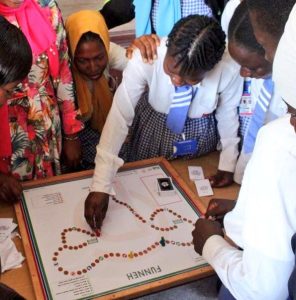
During the pilot phase, we introduced the board game on menstrual hygiene to five schools in The Gambia. A total of 276 persons participated in the campaign, including 191 girls, 78 boys, and 7 teachers. These numbers even included 51 students from a special needs school. The feedback we received was exceptional, with many students showing an increased interest in discussing sensitive topics with their female classmates.
After spending time at Akkon University, I also realized that Girls’ Pride’s work on gender equality could be published as a contribution to academia and science. Upon my return, I began working on an article with Akkon University titled, “Period Poverty: A Global Health Issue Affecting Women and Girls in The Gambia.”
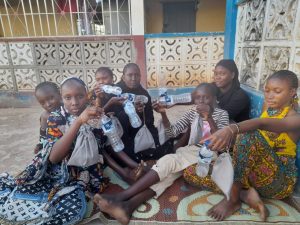
In addition to the board game, we also collaborated with Salisu on the “Plastics for Pads” project. This initiative provided women and girls from low-income families with reusable and eco-friendly sanitary pads in exchange for plastic bottles and waste. By helping these girls manage their periods with dignity, stay in school, and prevent urogenital infections and gender-based violence, we hoped to prevent transactional sex in exchange for money to buy pads. In total, 28 schoolgirls in rural Gambia benefited from the P4P pilot project, and the plastic waste collected was recycled into materials that could be used locally. The board game also received exposure at important exhibitions, including the International Women’s Day exhibition and the UNDP Accelerator Lab in The Gambia.
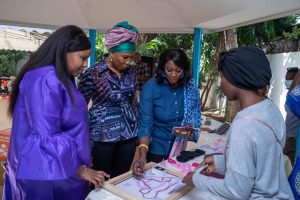
Guests at these events shared their positive experiences with the game on social media, attracting the interest of several potential partners. As we continue to receive requests to introduce the Funneh game to different schools in The Gambia and neighbouring countries, we are eager to scale the game with additional funding. We are already working on our vision for the future, which includes designing question-and-answer booklets and cards based on other gender-sensitive topics such as Teenage Pregnancy, Child Marriage, Female Genital Mutilation, Sexual and Gender-Based Violence, and Mental Health. We are also seeking support to digitize the board game into a mobile app that girls and women around the world can use to learn about different taboo topics while playing Funneh.
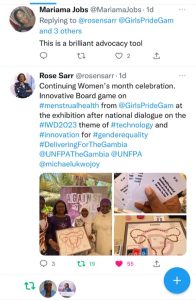
Finally, I want to share why we named the game Funneh. The word “funneh” means hope in a local dialect, and we wanted to give young girls and women in The Gambia and eventually worldwide hope for a more gender-equal and gender-sensitive society. Through the Funneh game and our other initiatives, we hope to break taboos, change mentalities, and create a brighter future for all.
By Fatoumatta Kassama


